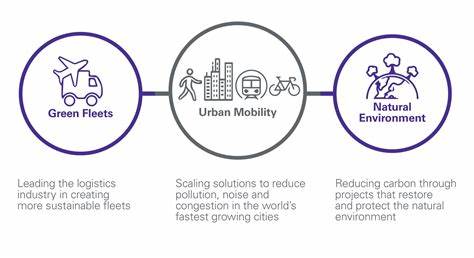
Sustainable Logistics and Eco Vehicles: Paving the Way Towards a Greener Shipping Industry
Introduction
As the world becomes more conscious of the environmental impacts of various industries, the need for sustainable logistics practices has become increasingly important. In this article, we will explore the role of eco vehicles in the shipping industry and how they contribute to achieving sustainability goals.
Historical Background
The shipping industry has evolved significantly over the years, but this progress has come at a cost to the environment. The use of traditional fuel sources in ships has led to increased emissions and pollution. Recognizing the need for change, previous initiatives have been implemented to improve sustainability in logistics.
Key Concepts and Definitions
Sustainable logistics refers to the implementation of environmentally-friendly practices in the transportation and supply chain industry. It is vital for reducing the carbon footprint and mitigating the environmental impacts of the shipping industry. Eco vehicles are vehicles specifically designed to minimize their negative environmental impacts.

Main Discussion Points
The benefits of eco vehicles in the shipping industry are extensive. Firstly, they help reduce emissions and air pollution significantly. By adopting eco vehicles, the industry can contribute to cleaner air and mitigate the negative impacts of traditional vehicles. Secondly, eco vehicles are known for their energy efficiency, resulting in substantial cost savings. In addition, they comply with environmental regulations, ensuring that the industry operates within legal frameworks.
Technological advancements have played a crucial role in the development of eco vehicles. Electric vehicles and hybrid vehicles are gaining popularity due to their reduced emissions and fuel consumption. Moreover, alternative fuels and renewable energy sources are being explored to further decrease the industry’s reliance on fossil fuels. Additionally, autonomous and connected vehicles are being developed to optimize logistics operations and enhance overall efficiency.
Case Studies or Examples
One successful implementation of eco vehicles can be seen in a shipping company that operates a fleet of electric trucks. This company has significantly reduced its carbon footprint and achieved considerable cost savings. Another example is the analysis of the environmental and economic impact of eco vehicles in a specific region or country, highlighting the benefits they bring to both the environment and the economy.

Current Trends or Developments
Major shipping companies are increasingly adopting eco vehicles as part of their sustainability efforts. These companies recognize the importance of reducing their environmental impact and are investing in research and development to improve eco vehicle technologies. Furthermore, governments around the world are implementing policies and regulations to promote the use of eco vehicles in the shipping industry.
Challenges or Controversies
Despite the many advantages of eco vehicles, challenges persist. Infrastructure limitations, such as the lack of charging or refueling stations, hinder widespread adoption of eco vehicles. High initial costs and limited availability of eco vehicles also pose challenges for companies looking to transition to greener transportation options. Additionally, concerns regarding the reliability and performance of eco vehicles need to be addressed to gain wider acceptance.

Future Outlook
Looking ahead, there is great potential for the growth and expansion of eco vehicles in the shipping industry. As technology continues to evolve, eco vehicles will become more efficient and reliable, driving their widespread adoption. Integration of eco vehicles with other sustainable logistics practices will further enhance the industry’s environmental performance. Emerging technologies and innovations, such as improved battery technologies and autonomous driving, will shape the future of eco vehicles in the shipping industry.
Conclusion
In conclusion, sustainable logistics and the adoption of eco vehicles are crucial for a greener shipping industry. The benefits of eco vehicles, ranging from reduced emissions to cost savings, make them an integral part of achieving sustainability goals. It is essential to continue investing in research and development, addressing challenges, and promoting the use of eco vehicles to create a more environmentally-friendly and efficient shipping industry.




